#essentially it’s a misdirection
Explore tagged Tumblr posts
Text
I love behindthename . com cos it’s the only place that doesn’t straight up tell me my name is a diminutive of the Irish and means “pure” which never made sense to me and always bugged me. Turns out it’s much much cooler
#everywhere it says catalina comes from the Irish Catherine. like. why’s it travelling in that direction. names and words rarely go that way#but the name trees on behind the name trace it backwards#so that catalina is from caterina (which becomes Catherine later)#but Caterina is from the Greek aikaterine#which is after Greek mythology’s Hecate#which is rly fuckin cool#it seems the pure meaning was somewhere back trying to catholosise it#because obvs don’t want the Hecate association#so Katherine comes from the Greek word katharos meaning pure#essentially it’s a misdirection#is seems Catherine could come from either#but catalina doesn’t have the kathoros route. only the caterina/aikaterine 4#route*#sorry the pure meaning always bugged me . felt like being called chastity or smth#felt like being imposed by a virtue idk#ultimately doesn’t matter tho ! cos it’s just a meaning
3 notes
·
View notes
Text
Themes of Implicit Submission in The Hunger Games (Book One)
I’ve just finished re-reading The Hunger Games (book one) and there are a few themes that I expect SOTR will develop based on Hume’s implicit submission theory. Specifically, these are the main six tactics I believe the Capitol uses to thwart another rebellion present in the first book alone:
Societal Pressure:
District 12 has a “keep your head down” culture. Any talks of rebellion are frowned upon. Any anti-government statements will cause social repercussions. It’s not just Katniss rolling her eyes at Gale in the woods, it’s how she has been groomed by the culture to keep quiet about the issues pervading life in the district:
“When I was younger, I scared my mother to death, the things I would blurt about District 12, about the people who rule our country, Panem, from the far-off city called the Capitol. Eventually, I understood this would only lead us to more trouble. So I learned to hold my tongue and to turn my features into an indifferent mask so that no one could ever read my thoughts. Do my work quietly in school. Make only polite small talk in the public market. Discuss little more than trades in the Hob.… Even at home, where I am less pleasant, I avoid discussing tricky topics. Like the reaping, or food shortages, or the Hunger Games. Prim might begin to repeat my words and then where would we be?” (p.6)
All of this proceeds the statement:
“Even here, in the middle of nowhere, you worry someone might overhear you.” (p. 5)
Under this point, it is also telling that during the reaping ceremony, Katniss says the “boldest form of dissent [the audience] can manage,” is silence. Not outrage, not yelling, not like district 11, but silence (p. 24).
2. Division between Classes
The Capitol has created conflict within the districts to draw hatred to a local target. In the case of the first book, Gale remarks tesserae is a tactic to keep them divided.
“Gale knows his anger at Madge is misdirected. On other days, deep in the woods, I’ve listened to him rant about how the tesserae are just another tool to cause misery in our district. A way to plant hatred between the starving workers of the Seam and those who can generally count on supper and thereby ensure we will never trust one another. “It’s to the Capitol’s advantage to have us divided among ourselves,” he might say if there were no ears to hear but mine.” (p. 14)
Interestingly, tesserae is already known as the “courtesy of the capitol” as stamped on Haymitch’s shorts in SOTR. The Capitol markets tesserae as something it does out of goodness. It attempts to make itself seem well-intentioned via the distribution of necessary goods. It’s their courtesy, after all.
This point also includes the division between the districts. In the games, Katniss remarks how allying with the careers is essentially traitorous.
“No one from District 12 would think of doing such a thing! Career tributes are overly vicious, arrogant, better fed, but only because they’re the Capitol’s lapdogs.” (p. 162)
By treating certain districts better, the Capitol promotes distrust between the districts, dampening potential unionization with planted hatred. By choosing favorite children, the parent that is the Capitol forces the districts to fight.
3. Weaponized Language
The name of the Treaty of Treason, the treaty that makes the Hunger Games necessary per the law, is definitive of how the districts are forced to see themselves. They are the ones who committed treason by rebelling, and therefore they are guilty. They must repent by sending the children to the games. The permanent treaty, read during every reaping ceremony, enforces the guilt the districts are supposed to feel. In turn, the fact it is a “treaty” means the districts must have agreed to and signed it. Regardless of the circumstances around the signing of the treaty, the capitol then has the ability to wave it over their heads henceforth.
The name itself points a finger and keeps the districts forever at fault.
Furthermore, the fact Katniss is referred to by her district number until and even after she is given something to remember her by (the fire) further dehumanizes the tributes. During the parade, she says the citizens of the capitol have liked her and Peeta enough to "read the program" and learn their names (p. 70).
There are many more examples of villainizing and dehumanizing language in the book, but I have chosen those examples for the sake of brevity.
4. Propagandizing Education
A major theme in many dystopian novels is how the system treats education. In District 12, Katniss tells the reader:
“Besides basic reading and math, most of our instruction is coal-related. Except for the weekly lecture on the history of Panem. It’s mostly a lot of blather about what we owe the Capitol.” (p. 42)
A weekly lecture in a school is quite a lot of time to devote to any one subject. Seeing as how the rest of their curriculum revolves around district-specific content, the weekly lecture must be mandated across all districts, likely leaving the rest up to the discretion of the district itself. The Capitol once again emphasizes how the districts were wrong. It is repeated week after week, and eventually, it becomes ingrained in the social psychology of the district.
5. Hunger and Deprivation of Needs
Continuing from the section about Katniss knows the weekly lecture must be propaganda, saying,
“I know there must be more than they’re telling us, an actual account of what happened during the rebellion. But I don’t spend much time thinking about it. Whatever the truth is, I don’t see how it will help me get food on the table.” (p. 42)
This point coincides with my second point about the division of classes. By keeping the people hungry, they are too busy thinking about the lowest rung on Maslow’s Hierarchy of Needs. They see those who have food, and they are the opposition in front of them, rather than examining the source of the problem. By keeping the people hungry, they are less likely to have the time or ability to even think about a collective uprising.
6. Limiting Flow of Information
The Capitol limits the flow of information between districts. In doing so, the districts are forced to make bridging assumptions about one another. This is revealed through Katniss and Rue’s discussion in the games:
“It’s interesting, hearing about her life. We have so little communication with anyone outside our district. In fact, I wonder if the Gamemakers are blocking out our conversation, because even though the information seems harmless, they don’t want people in different districts to know about one another.” (p. 203)
By keeping them separate, they can turn any district against another. They rely solely on the Capitol for information about other districts, and therefore the Capitol has all of the power.
Interestingly, another division between classes is shown through Peeta’s knowledge about other districts. He knows the different types of bread from the districts, implying the merchant class may have more access to information than those of the seam, leading to further division between classes.
All in all, these are the themes I expect to be addressed in SOTR based on the pretense of implicit submission.
See Catching Fire's themes here
See Mockingjay's themes here
#this is long ty for reading#can you tell im so excited for sotr#i tried to format it well#hope it worked im still fairly new to tumblr haha#the hunger games#sunrise on the reaping#thg#haymitch abernathy#catching fire#mockingjay#peeta mellark#katniss everdeen#sotr#implicit submission#david hume#essay#president snow#thg series#hunger games#thg philosophical essays
223 notes
·
View notes
Text
Blitz and social class rage- because I have no chill and like to write about uncomfortable things.
We've seen a lot of hints (reactions to how Stolas addresses him as "little," confrontation with Striker in Harvest Moon), but I think that we see that rage at its most intense here and here.
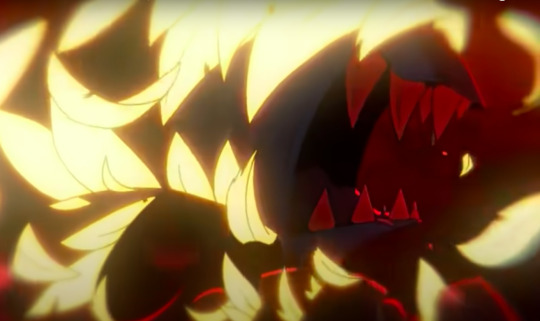
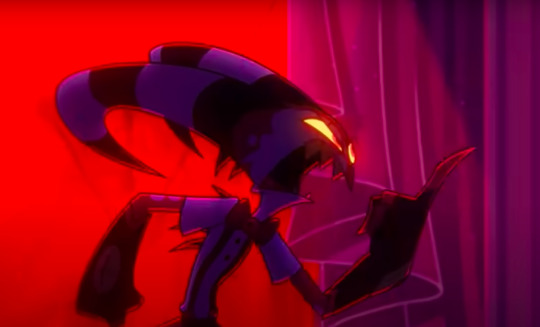
The symbolism in both of these scenes has been analyzed a ton by now, and I don't think the parallels in subject matter are accidental- both are essentially Blitz going into a terrified rage (are fear and anger linked for him?) at the idea- an untrue one based in real social class problems- that Stolas could never respect him.
There's imagery of Blitz as a servant in both scenes. Sillhouettes of Blitz fan Stolas in his drug trip in Truth Seekers. He adjusts his bow tie and claims that Stolas treats him like one of his butler imps during his rant in Full Moon.
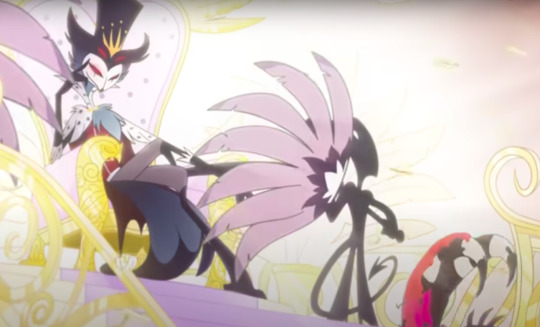
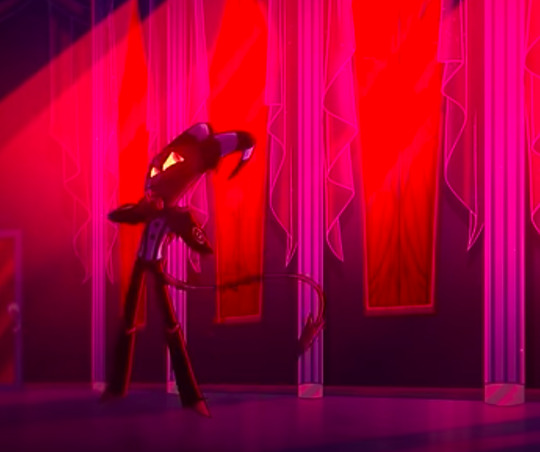
But the anger Blitz feels about this ALSO came out, more subtly, in my most replayed couple of minutes in Oops (seriously- when I clicked on Oops to find screenshots, I was already paused here).
It's the scene where Blitz won't stop talking about how little Stolas cares about him, and Fizz gets fed up with him denying the obvious. It leads into a back and forth with Striker about social class and relationships with royals. It's one of those shippy moments that I watched on repeat to reassure myself that stolitz is mutual while we waited for Full Moon. Because it's clear in that clip that he CARES deeply about Stolas as much as he denies it.
But wait. When he calls Stolas a "fake privileged asshole . . ."
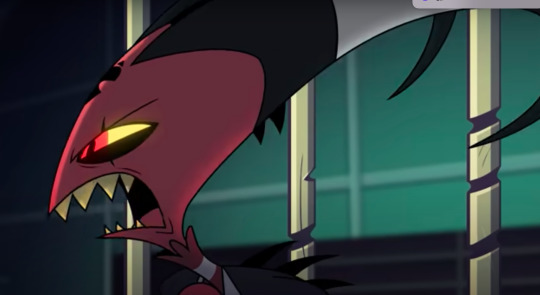
There's real resentment (and fear? hurt?) there. I mean the guy is fucking furious- it's also the side view with the sharp teeth and narrowed eyes again. This is not the face of a man who's just upset because the guy he likes doesn't like him back. This is deep hurt, and yes, anger. It hurts to see him feeling resentful toward Stolas because I love Stolas and love the potential they have together.
So what gives? Why is this anger/fear so intense that he can't see that potential? I saw a lot of speculation before Full Moon that Blitz might have another royal ex who we have yet to learn about, or that he was devastatingly wronged by one of Hell's higher ups in the past.
I don't think that's necessary personally. I think Blitz is angry about a lifetime of micro-aggressions and racial slurs, at living in a world where people are surprised that he's an imp who runs a business, etc., and that's enough. He's angry because he was taught from childhood that he was dispensable (not me taking a dig at Cash again just because). He's angry at himself for having feelings for Stolas, for feeling comfortable cuddled up next to him when he snapped that one picture on his phone, for wanting what seems impossible.
Blitz has anger issues beyond this- there's no doubt about that. And I think A LOT of it comes down to his self-hatred and inability to process the hurt and fear that simmer underneath. But yeah, there's legitimate anger about race and class issues there too, maybe misdirected at Stolas, but absolutely reflecting a reality in the hellaverse.
#blitzo buckzo#stolitz#blitz#blitzo#my baby#my helluva meta#Please don't misinterpret my social class shit- I love stolitz and will infinitely defend them both#I started by writing about his anger in general- I'm kind of fascinated by it- but that post would be too long
551 notes
·
View notes
Text
Fic HCs - Who is the best locater
O/c can go invisible, have fun! - These are also notes for me too when I am writing :)
Viltrumite- Mark:
Canonically is full viltrumite, has good hearing, more sensitive to changes in air pressure, the little details. This man is a true warrior. he usually doesn't give this many chances, but for you? you seem to be the exception.
Viltrumite may not know exactly where you are but terrifyingly he is usually very very very close. fair enough, if you are somewhere that won't show footprints i.e (anywhere not covered with debris (Actual spent 10 minutes trying to remember how to spell a damn word)/a soft fuzzy carpet/pigmented liquids/basically anything that could cut your feet or legs or leave a trace. Steam is debated, it would be like an eye trick and something very difficult to spot but Viltrumite does actually find you in a steamy scene (later down the line) Only talks in a clinical way, stating the obvious when he knows you are there- it was too much to watch the other versions of himself make fools of themselves.
Probably the best at locating once he has a lead. No leads, not much of a chance even if he is circling everywhere as fast as possible, trying to be efficient.
Omni- Mark:
This man is impatient, just wants to find you, he makes mistakes a lot. Falls for the old, throw an object- misdirection shtick a lot too- merely out of being thorough in the chase, but he would never compromise your safety just to find you. Green flag covered in red (literally)
Gives you chances (even if he is off kilter and you are actually not there like he thought) to come out, knowing you probably wouldnt either way, tries to bargain in a way which sounds completely unsettling given his bargaining was more along the lines of "The others are growing bored of this game, everything will be burned down starting next hour. you need to come out" complete lie. he gave you numerous little emergencies and suggestions with horrific consequences yet they hadn't happened- except when Sinister accidently caused a wild fire.
Chances are you are more likely to show yourself to him than the others, the situation depends but he is not finding your ass on his own, just so long as he doesn't smell your perfume.
Lenseless/No goggles- Mark:
Totally in the "You kinda want him to find you before he starts tearing shit up for funsies" category. But!! he does apologize if he gets you. A little "sorrrrrryyyyyy" here and there when he inevitably notices the the small lines of floating blood- or worse, if the 'love tap' fucks with your hold and you accidently blink into visibility.
The more you make him wait when he DOES know, the more it's going to turn into a cat playing with the mouse until you just acknowledge him and maybeee entertain him for a bit- he loves telling you about his 'excursions' and stupid stories usually pretty gory but the way he talks about it, you'd think he was freestyling stand up comedy.
Kind of a hit or miss- he might have a clue, but usually not before he's caused a little pain by accident, but he will kiss it better.
Sinister- Mark:
NONONONONONONONONO you don't want him to find you, but shit can get dangerous quick if you don't give him a hint. Dangerous in the holy fuck he's about to start throwing cars, trees up in the air like a fatal game of hot potato... punching through a level of a building you are on kind of bad. You will get hurt, but the man is scary.
He is the most unfazed about causing harm to you, not in the life threatening kind anyway- just like a little cut hear and there, maybe a little bruise or a broken limb when you refused to tell him you were and he took that as a challenge against nature.
If you so much as breathe if he is nearby- he will hear it. Gets cocky about it, blocking exits, talking like you aren't in the room. Who wants to hear the most brutal ways to die when you are essentially stuck in a stale mate with a variant of a superhero with the power of a malfunctioning hydraulic press? no? well he's gonna talk about it anyway, he likes you scared.
3/10 in being able to find you himself.
Mohawk- Mark:
Will fall for the stupidest tricks, and it doesnt help that he is a little unhinged.. unhinged in the sense that he sees a curtain moving at a drafty window and thinks 'Yes!' but really it's just the draft. he is constantly listening for movement which he might have heard if he wasn't busy talking and pawing at air.
100% has zero clue where you are without any obvious visual clues or vocal- it's like a game of cat and mouse on steroids. He says the most fucked up shit in the hopes he will get a peep out of you. Knows what to say to rile you up which makes being quiet hard sometimes.
No clue out the wazoo- give the boy a bone.
Flaxan- Mark:
Different from the other variants because he grew up in Flaxan (presumably murdered them all and rose to power/king status) He has tech that can detect thermal temperatures. You are completely fucked and caught in 4k because he 100% is finding you.
Doesn't need to resort to threats or bargaining or looking like an ass just to try and make out where you are- he knows and he won't wait for your tricks because he's the grabbing type- i.e. not a chance to turn around before being swept up and in the air.
Unless there are other lifeforms nearby (doubt) you won't be undetectable. 1000% finding your ass before you see it coming.
Prisoner- Mark:
He is patient. very patient. he did time and he can wait it out. He couldn't exactly rely on his hearing given the shell of his ears were scarred from viltrum torture.
His best chance is if you just straight up announce your presence but of course you aren't going to do that- he looks terrifying but he's not as... bat shit as the others or too indoctrinated to viltrum ways. You aren't exactly safe with him either but at least he has the decency to try and hide it.
2/10 - his chances aren't great.
#mark grayson#mohawk mark x reader#mohawk mark#mohawk invincible#viltrumite mark#viltrumite mark x reader#lenseless mark#no goggles mark#invincible x reader#omni mark#sinister mark x reader#prisoner mark#prisoner mark x reader#flaxan mark#sinister mark#mark grayson variants#invincible variants#lenseless mark x reader#no goggles mark x reader#Fic headcannons#invincible
87 notes
·
View notes
Text
I’m sorry, but my type-a ass cannot be against the Rat Grinders. They’re essentially the kids that couldn’t get the special treatment from teachers and get by on stumbling through tests and happening to get an A without studying. The Rat Grinders feel less like people who cheated the system, and more like the kids who aren’t naturally gifted or lucky, and have to spends hours on end studying, doing extra homework and extra credit, losing their social lives and free time to catch up with the kids who can just breeze through it. Fig never went to a single class or did any homework but gets away with it because the coach, lunch lad, and vice principal are her dads, Kristin and Riz did literally the worst thing their respective class can do, Gorgug actively works to avoid using the main feature of his class whenever possible, Adaine became the Oracle through seemingly happenstance, and Fabian’s rich family bought his way into the extra curricular he’s now the captain of, and all of them skipped half of freshman year! Obviously we, the audience, know that they worked their asses off to get through school each year and to get where the are today. We know they earned every little good thing they have! Fig has worked so hard to become the rockstar she is! Kristin literally brought back a god! Riz in a supergenius detective! Gorgug is an incredible barbarian and artificer! Adaine works so hard to help all of her friends survive a toxic system! Fabian slaved away to earn his achievements himself instead of letting his father’s legacy be his identity! But think of it from an outside perspective, without all the knowledge that only the audience has! These random kids stumbled into three adventures that let them skip grinding for XP, got to miss half a year with no consequence, get special privileges and quests because they are related to or friends with the faculty, never do their assignments or go to class, became popular because of their privileges, and now randomly start spouting micro aggressions towards halflings? If I was one of the Rat Grinders, I’d be pissed off too! I’ve been both the gifted kid, seemingly effortlessly breezing through classes and befriending the entire faculty while secretly going through terrible struggle and stress, and the kid desperately trying to game my way through a system built to harm me while being furious at those who seem to thrive in it, and I can’t help but feel empathy for both. I don’t think the Rat Grinders are evil, cheating monsters who plan to destroy the Bad Kids out of spite. I think they’re just kids in a harmful toxic school system that have a lot of righteous anger at their lot in life, that has sadly been misdirected. Idk if this ramble made sense, sorry for the wall of text!
Edit:Introducing Ivy Embra, the first Rat Grinder to actually be antagonistic to anyone in any way! Also introducing Oisin Hakivar, a super nice guy who’s willing to take advantage of his generational wealth in order to help a fellow student! So the first Rat Grinder to actively be nice to someone too! He likely did something with the ice mephits, but he still seemed genuinely sympathetic and helpful to Adaine!
#dimension 20#fantasy high#d20#fantasy high junior year#fh:jy#fhjy spoilers#fhjy#rat grinders#kipperlilly copperkettle#ruben hopclap#idk if this made sense#mary ann skuttle#ivy embra#oisin hakinvar
553 notes
·
View notes
Note
Hi hi Fia! I was just listening to Mis-Directed again. It got lost since Boss was right before it and that cut like a knife but we really should have taken so much solace in it knowing that Lukola did not want to private, they wanted us to know. Its release was prior to awards season so they weren't trying to hide they fell in love on set as if it was a detriment to their acting or that they weren't really acting. They are good actors and they also fell in love ❤️ Misdirected was essentially a tell-all and we should celebrate it! 🙌🫶 🎉
It really was overshadowed by Boss 😞 I tried getting into it and found myself de-noising "Let's get this done" instead lol. But it truly is a reflection of Lukola in so many ways. I'm convinced N did that particularly themed audibook to be able to fit in her on set love story w/ L - and it really is beautiful.
Thankfully not all of us were distracted and Three Act Tragedy did a nice review of the parallels and @jmuz09 recently reviewed it and found some nuggets that confirm they weren't hiding that art imitated life - and yes, prior to the SAGs.
A few LOUD story points:
1- Their characters are in a relationship irl 👫. When a reporter asks about them being seen kissing in the street, Hattie replies “our characters are embarking on a romantic relationship isn’t that what this interview is about? The new story lines, fictional love lives which are other people’s business”.
2- The characters deliver lines that are scripted but are the actors' emotions irl 📜. "'I love you’, they were Iris’ words but the slight crack in her voice wasn’t scripted nor was what she saw in Anthony’s eyes”. There was also a point at which Hattie was nervous about a 2nd intimacy scene w/ Anthony, as she'd never had an on-screen partner so vulnerable & authentic - and one that made her thighs wet.
3- They are ready to be public 👀. They declare their love for each other in front of everyone on set. They kiss and someone points out there is a reporter recording everything and it will probably be on sm in less than an hour, to which Hattie’s replies “I don’t care... there was no longer anxiety or reservation, this was the right person the right time and she was ready for all of it and it was worth everything and anything"
Note: even if you just listen to the last 4 min. of the final chapter, it indeed tells all!
But perhaps they wanted us to move on from it because it was poorly timed - a well laid crumb that they didn't want to gain too much attn. because it was problematic for the A narrative that L needed to wrap up. *sigh* It did double as one of the promos designed to make us look away from the likely arrival of BN, however.
And let's remember, this was recorded in September... it's quite possible it was supposed to come out earlier 🎧
youtube
74 notes
·
View notes
Text
I just realized that Netflix's official compilation video "The Eleven and Hopper story" was released after Hopper had supposedly died to feed into the idea that it was over.
And their official compilation video "Eleven and Mike's Love Story" was released after season 2...because that was the end of their love story.
They did have a love story. Absolutely, and validly. They met, they fell in love, they missed each other, they were reunited. And that is all true. Beyond that...their story isn't a romance anymore. The choice of timing. I'm observing the very specific choice of timing to release that.
No others have been. They didn't claim that Jonathan and Nancy's or Lucas and Max's was done. They haven't even released one of Joyce and Hopper since them getting together in season 4. But just like the illusion of Hopper's *death*, they released it after season 2 to represent that it was over.
It was a recap of something past. "Remember?" Because it's over now. It's dead.
Also, ironically, both compilations were strategically released as a misdirect as part of the puppeteering of the audience. One to convince that Hopper was dead, one to convince that Mike and El were endgame. Specifically, they even released it the day before season 3's release - knowing that the love story wouldn't actually be continuing in season 3. The El and Hopper one, on the other hand, was released shortly after season 3. Shortly after season 2 for Mike and El would have been "wasn't that so cute", just like Hopper and El was "weren't they so great". This was them essentially saying "as we enter our transition into them as friends, let's take a moment to appreciate the romance we had with them while it lasted."
It was a loving goodbye. They posted a goodbye edit, recapping the good times they had back when they were in love.
Also, as always, I am deeply hoping for a post-season 5 one of Byler to basically say "yes, this compilation starts in episode 1 because, yes, this was a romance the whole time". Clips of him being worried in ways the others aren't etc. Just a recap feed-it-to-you prove-it-was-planned for people who don't want to the whole rewatch and won't check their facts themselves. Them posting it with pride like that would also be huge to me. It takes ownership of it as THEIR ship not for the fans in service but WE wrote this and we wanna talk about how great it's been.
42 notes
·
View notes
Text
Can we give some grace?
I know a lot of Lukola fans are not super happy with Nicola right now.
The fact that she took Jake Dunn to the BAFTA TV Craft Awards nominees’ party on Thursday and tried to play up that the two of them were a happy couple rubbed a lot of fans the wrong way. It rubbed me the wrong way as well.
I think fans are especially upset because taking Jake to a party that was for her as a solo nominee seemed to not only take away from her time to shine as a nominee, but it also seemed to go against statements she has made in the past about not wanting to be known as someone’s girlfriend.
With that being said, I am choosing to give Nicola some grace. She is human, and human’s make mistakes.
I googled “giving someone grace” and this is what I found:
“Giving someone grace means offering them kindness, patience, and understanding, especially when they've made mistakes or fallen short. It involves forgiveness, compassion, and a willingness to see them with understanding. Essentially, it's about treating others with generosity, even when they may not deserve it.”
Nicola’s life has changed SO much in the last 2 years. I can’t even imagine how hard it would be to go from just a normal person living their life, who can do normal things, to someone who is famous, being recognized (and even followed) and scrutinized for every move they make.
Yes, she chose the career she is in, but there was no way for her to know how famous she would become or how it would affect her. This is something relatively new that she is navigating.
Just because we are fans of hers does not entitle us to know every part of her life. Yes, we saw the love and connection between Nic and Luke. Yes, many of us believe Nic and Luke could be married with a baby. The thing is…as much as we would like confirmation from them, we are NOT entitled to that information. That is information that they get to share if and when they are ready to.
I know with all of the perceived misdirection, PR stunts, and possible NDA’s going on, it is easy to get weary as a fan.
I am completely disheartened by the amount of comments I have read of people saying they have stopped following Nic over this and even encouraging others to do the same. These people seem to want to “teach Nic a lesson” or to “put her in her place” because they feel she has the fame she does because of them.
I think if a person can stop following a celebrity over something so callus, they were “fair-weathered” fans to begin with, and who needs fans like that?
I also find it odd for someone to stop following a celebrity and yet continue to go read and comment on their fan blogs, trying to sway others to stop following them. If I no longer care for a celebrity, I do not spend any more of my time thinking of them or talking about them. That makes absolutely no sense to me.
If someone needs to take a break from this fandom, do so. I know it can get intense. However, to spew hate is unacceptable to me.
I don’t think anyone has stopped to ask if Nicola even wanted the fame that she has achieved. To me, it seems like she just wanted to have steady work doing a job that she loves and is good at.
I do think she has enjoyed the ability her fame has given her to share the platforms she is passionate about. I also think she has enjoyed the brand deals and projects she has received because of her fame. I just don’t think she has enjoyed fame itself. To me it seems like she enjoyed being able to do things in anonymity when in public with her friends and family.
Essentially, we can speculate about Nicola’s and Luke’s lives as much as we want to, but none of us really know the details of their daily lives. We do not know what is going on bts between the two of them and exactly how Antonia and Jake fit in. Only they know the full details of everything going on and I believe they are trying their best to navigate a, most likely, tricky situation.
I enjoy trying to make an educated guess of what is going on. I don’t think it is harmful to speculate or try to piece things together. I just think we all need to realize that our speculations could be wrong and remember that we don’t actually know them.
I plan to continue to support both Nicola and Luke in any upcoming projects and to celebrate their successes. I plan to continue to speculate and share my opinions here on my blog. I also plan to try to give them both grace when I see them do things that I don’t like or that don’t make sense to me.
I hope (both for the fans, but also for their happiness and sanity) that they do share good news with us all soon. Until then, I will continue to sit here and cheer them on.
49 notes
·
View notes
Text
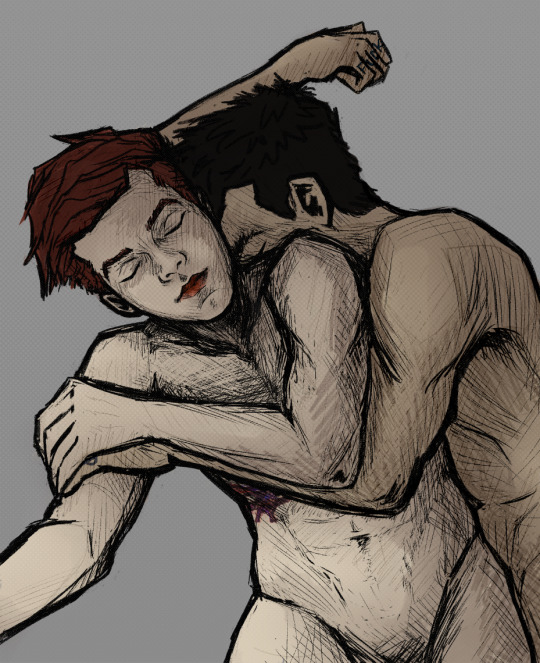
My submission for the Gallavich Fanart Masquerade 2024
Doing this art was so strange, i tried really hard to go against all my instincts and habits!! It was kind of a fascinating and weird exercise in trying to pick apart all the little things that makes my art look like me...and then *not* do those things. I even tried to draw ian and mickey from an era and with the haircuts that I usually don't go for. this whole artwork is me trying to not do my own artwork, and yet it still came out like me in the end anyway i think. wild how that works!! The title on ao3: You Are Pure Beside Me as a Sleeping Amber, (from Pablo Neruda's Sonnet LXXXI), was another meager attempt at misdirection as i essentially dont know a single thing about poetry. ...and also im usually quite allergic to proper capitalization 🤪 Very interesting experience but super fun!! Thanks @gallavichthings for the event and thanks to everyone who played and commented and kudos'd!! <3
#shameless#shameless us#shamelessnet#shameless fanart#gallavich#gallavich fanart#ian x mickey#ian gallagher#mickey milkovich#my art#myshameyart#why yes i did feel vaguely like i might hurl all week long#still kinda do#fanart masquerade#GFaM2024
259 notes
·
View notes
Text
I do find it interesting how so many section of Les Mis’s convent digression are essentially Callout Posts for Jean Valjean.
There are times when I wonder how much Hugo wants us to see Jean Valjean’s self-isolating/self-harm behaviors as self-harm, and how much he wants us to see them as Noble Self-Martyrdom. (Ex: sleeping in a cold hut in the backyard while Cosette has the house, eating bad food while Cosette eats well, excising himself from Cosette’s life planning to die alone, exiling himself from humanity to live alone.) He recreates the patterns of the convent long after he’s left.
But these chapters make it clear that Hugo is criticizing that kind of behavior— obsessively doing penance via self-harm, while isolating yourself from the world. It’s a real stark criticism of Jean Valjean’s constant self-exile.
If you replace “convent” with “Jean Valjean,” a lot of this feels like a very pointed descriptions of Valjean’s self-destructive behavior at the end of the novel:
When one speaks of convents, those abodes of error, but of innocence, of aberration but of good-will, of ignorance but of devotion, of torture but of martyrdom, it always becomes necessary to say either yes or no.
A convent is a contradiction. Its object, salvation; its means thereto, sacrifice. The convent is supreme egoism having for its result supreme abnegation.
(…)
In the cloister, one suffers in order to enjoy. One draws a bill of exchange on death. One discounts in terrestrial gloom celestial light. In the cloister, hell is accepted in advance as a post obit on paradise.
(…)
Sacrifice that is misdirected is still sacrifice. There is something grand about making a serious mistake a duty.
181 notes
·
View notes
Text
When Fatima tried to enter the Colony House, it seemed like the door was locked. She got distracted by the smell of rotten vegetables, but the other woman entered without any trouble. Looking back, it’s almost always Ellis or someone else opening the doors for her. Could this mean she’s turning into a monster, or that her baby is one? That feels like the obvious route to take with her story, but it could just be a regular pregnancy, like Marielle suggested. Maybe they're trying a bit of misdirection with the audience, eh?
What did Marielle say, that it's hyperemesis gravidarum? Apparently, it's a severe form of morning sickness characterized by extreme nausea, persistent vomiting, which can lead to significant weight loss, dehydration, and electrolyte imbalances. Repeated vomiting can wear down tooth enamel and increase the risk of decay—not exactly tooth loss, but her condition is likely worse than others due to the lack of access to a dentist and basic oral hygiene products like toothpaste, floss, and mouthwash.
The next question is: why is she eating rotten vegetables? This could be explained by pica, an eating disorder that can occur when the body is low on essential minerals and nutrients like iron and zinc. Pica can happen at any time, to anyone, and women can develop pica during pregnancy. Some people might eat substances like dirt, clay, cornstarch, or even other non-food items like stones, mothballs, and paint chips. Given that she hasn’t eaten anything in three days, it’s quite possible that she has developed pica.
Some people have suggested the food was intentionally rotted to provide her with something to eat. This could hint at her having a monster baby, but it may also be unrelated.
Whatever force controls the monsters and the town clearly operates under its own set of rules, which are always rigged in its favor. It takes something away while offering something in return.
A lot of people in the Colony House died, but then a bus full of people show up. Interestingly, I can't recall who it was, but someone expressed concern about not having enough food to feed everyone. Shortly after, we see that the crops they were growing have all rotted away. Now, they really don't have enough food to feed everyone.
Tian Chen remained hopeful, suggesting they could grow the food by planting the crops in different locations to find suitable soil. Then, Jim and Kenny discover a patch of cabbages growing amid the remnants of an old village. That location wasn't there before, but now they have enough food again and a new place for their crops to grow.
It feels as though something is listening; it knows what’s on their mind, and offers them hope (or makes their fear a reality), only to crush it later. The townspeople aren’t just a source of entertainment for it, they’re likely the very means by which it sustains itself. It's their fears and hopes that make their despair (or soul) all the sweeter to consume.
Why else would the radio in the dinner turn on when Kenny was grieving? It taunted him, but at the same time, that radio was the same one that gave Boyd a sign to explore the forest.
It's clear that some kind of overseer entity is listening and watching them all. I wonder how long it will take for them to realize they need to be more careful about what they say aloud, as their words seem to manifest into existence.
106 notes
·
View notes
Text
Does Hilary Swank play adult Melissa?


It's been revealed that Hilary Swank will play an unspecified character in Yellowjackets season 3. A popular theory is that she's going to play adult Melissa, which I do believe is a high possibility, as well as being the person who left the tape at Shauna's house and the phone at the restaurant. Shauna and Melissa's kiss scene in the teen timeline was juxtaposed with Shauna asking about the phone and learning a woman came to retrieve it, so I can't see it being anything but foreshadowing.
But there is a specific reason that makes me believe Hilary is playing adult Melissa. In a close-up in the season 3 trailer, it seems like this woman she's playing has blue eyes.
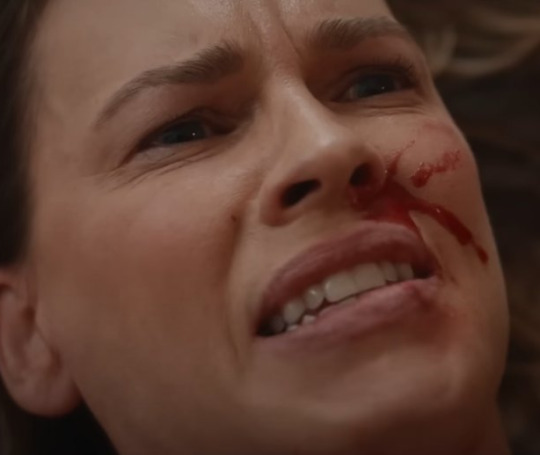
Hilary Swank has naturally brown eyes. I can't see many reasons why they'd make the actress wear blue contact lenses other than because she's playing the adult version of a teen character who has blue eyes.
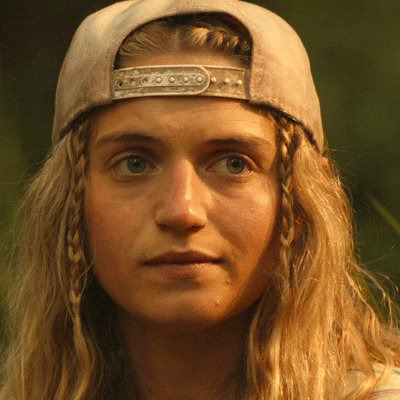
Melissa does have blue eyes, and given Jenna was cast before, it makes sense they'd make the actress who plays her adult version wear blue contact lenses to match the already-established character. It's most common to give light-eyed people darker contact lenses since it does tend to look more natural (hence why Sophie and Sammi, who have blue eyes, wear brown contact lenses to fit their adult counterparts, and Tawny who has green eyes too). So if they are making Hilary wear blue contact lenses (which do look a bit darker than Jenna's eyes), it's probably because it's essential to the character. They might have given them a darker shade of blue so it wouldn't look too jarring on her.
Other reason why I think adult Melissa might be the one who left the phone is because Shauna asked for a physical description of the woman. We don't hear it, but perhaps she was simply told the woman was blond. That might explain why Shauna assumed it was Misty. As for who is seemingly attacking Hilary's character in the trailer (prompting her to say "you really are insane") it might be Callie. If she listened to the tape before Shauna and decided to confront that woman, the reaction might be because Callie reminds Melissa of Shauna, it's her realising "she's just like her mother".
I don't know if she's necessarily the one who cut the van's break thought, that might be a misdirect. She might have been trying to warn Shauna about a potential threat. The trailer paints her too much as the new antagonist for me to think she is. This might be a red herring.
But that's more of a speculation and theory. The main takeaway here is that I do think it's likely that she's going to play adult Melissa.
#yellowjackets#yellowjackets s3#yj season 3#yj spoilers#Melissa yellowjackets#shauna shipman#shauna sadecki#callie sadecki#theory#shaunahat
44 notes
·
View notes
Text
Suspects and Red Herrings in Mystery Writing
SUSPECTS
In mystery writing, a suspect is someone believed to have committed a crime, but they are not necessarily the villain. They are side characters who help drive the story forward, adding layers of intrigue and misdirection.
For example, if someone is suspected of murder or kidnapping, the protagonist must investigate them thoroughly before proving—beyond a reasonable doubt—whether they are guilty or not. A rushed or baseless arrest isn't just unrealistic; it can be a sign of police brutality or judicial incompetence, which can actually serve as an interesting plot element.
Example Scenario:
An officer is called to reinvestigate a crime and discovers that his close friend—also an officer—was originally in charge of the case. As he digs deeper, he realizes that his friend knowingly arrested the wrong person and kept quiet to protect his reputation.
In this setup, the officer’s friend initially appears trustworthy, but over time, subtle clues and contradictions make readers question whether he might be the true perpetrator. To make this work, other suspects must be introduced to divert suspicion, keeping readers engaged and unsure of who to trust.
RED HERRING
Red herrings are one of the most effective tools in mystery writing because they create tension and misdirection. A red herring is a suspect who appears to be the villain—convincingly so—only to be proven innocent later on.
To break it down:
Character A = A suspect with some evidence against them.
Character B = A red herring suspect who seems guilty but isn’t.
Character C = The true villain, who remains hidden until the climax.
Example Scenario:
The protagonist is investigating Characters A and B in connection to a crime. He gathers strong evidence that suggests B is a false witness who misled the authorities. Readers are convinced that B must be guilty.
But then, as the protagonist keeps digging, he realizes something is missing. The real mastermind—Character C—is still in the shadows, pulling the strings. However, there’s barely any evidence against C, making it a challenge for both the protagonist and the reader to uncover the truth.
A good mystery balances evidence, misdirection, and suspense to keep the audience engaged. Sometimes, the red herring may know the villain but refuse to reveal them for personal reasons. Other times, they were just a pawn, unknowingly working for the real culprit.
The Importance of Personal Stakes
A mystery shouldn’t rely solely on the crime itself—personal stakes keep readers emotionally invested.
Consider adding:
Threats against the protagonist.
Superstitions, like an abandoned building people warn them to avoid.
A personal connection to the victim.
For instance, if the protagonist is investigating a case that involves their missing sibling, the emotional weight of the story increases. Readers will care not just about solving the mystery but about the character’s personal journey as well.
Bonus: The Role of Clues
Clues are essential pieces of evidence that help the protagonist solve the mystery. They can take many forms, from physical objects to subtle inconsistencies in alibis.
Examples of Clues:
Objects: Keys, pictures, old toys, rings, SIM cards, ATM receipts.
Technology: Forgotten emails, deleted messages, CCTV footage.
Documents: Journals, diaries, favorite books, old letters.
Locations: Hidden compartments, locked rooms, abandoned offices.
A well-placed clue, hidden in plain sight, can make a mystery all the more rewarding when the reader looks back and realizes it was there all along.
Next Week’s Topic:
Next week, I’ll be discussing how to write a compelling main villain, from a hidden mastermind to an outright antagonist. Follow for more, and don’t hesitate to leave a comment or like if you found this helpful!
#writing#story writing#writerscommunity#writing community#writers and poets#fiction writing#african writers#nigerian#writer#writers#black female writers#female writers#mystery#mystery writing#whodunit#whodunnit#writing tips#writing things#writing thoughts#writing stuff#written#writers on tumblr#writers on writing#writers life#writeblr#writterscommunity#writting#writters on tumblr#new writter#fiction
35 notes
·
View notes
Note
Do you think there is any merit in the aggressive route? (I don't think it has a common consensus name, but I like to call it "Lost Route", in reference to enemies getting LOST)
The consequences seem to be inconsistent, with Berdly's arm's fate hinging on whether you fought his and Queen's boss fights with damage or not, and Tenna's fate hinging on two necessary recruits and ignoring wheter you beat him with violence, and Jackenstein's on having no lost enemies I think?
The [FIGHT] option seems to be neglected in being telegraphed to the player, essentially discouraged, until the Aurafarmer suddenly jumps in and makes it required.
Regardless of whether it's... questionably designed, I wanted to ask whether you think there is any point to tell, like there would be in the Undertale's Neutral routes. Like "the bonds you break make you stronger" and if there's anything beyond it.
Oh, this is interesting. I can't give too thorough an answer because I honestly hadn't sat with it too much until i got this ask. I've actually never tried this route, so I'd have to find footage and break it down. It's interesting in that it's not Snowgrave- in UT you just had to be violent, but in DR there is a very specific type of violence that leads to the "bad ending"
I do think gameplay wise it's going to be the closest equal to UT's neutral routes. Due to the nature of each game, DR's balance of violence and pacifism is more nuanced than UT, which I appreciate for being its own thing. Obviously the meta reason is that sometimes there will be players who will want stat increases for strategic reasons, but because UT was meant to make you feel like your actions have the same weight as they would if the pixels were real people, every murder in UT feels insane, where DR is touching more on the themes of unreality, escapism, and parallel dimensions. The division between both worlds is thematically relevant, so the nuance is needed.
I find it interesting despite Ralsei's utilitarian views of himself and fellow darkners, and his obedience even if you instruct him to be violent, that he still insists that you be kind to the darkners. This makes me believe his approach is a sort of cope to deal with whatever big suffering or sacrifice is implied in the Last Prophecy, and in truth he values his life and others'.
The thing you say about the telegraphing is real, at the same time, we know that toby deliberately put ACT as the second command because, iirc, he wants you to consciously ACT, and attacking would be your baseline, automatic, unga bunga response. That makes the dissonance between FIGHT being narratively discouraged but mechanically encouraged fascinating.
It does lead to unexpected/Funny results though. My first ever you became stronger outside of the one purposeful snowgrave run was this and it was half-unintentional.
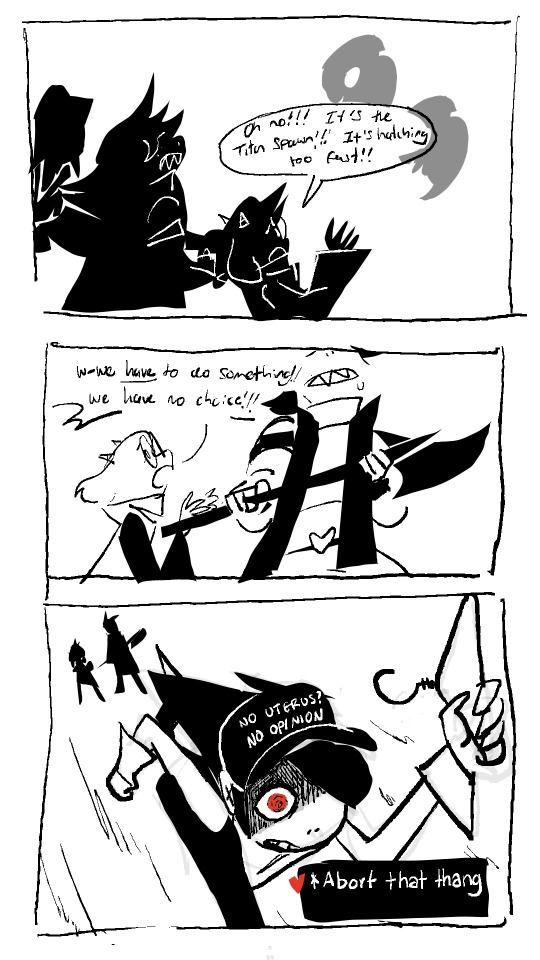
I forgot that you could purify the fetuses, I saw the X over the mercy bar and, having fought the knight, I was like, well, i guess there's one thing to do... And I did get stronger. There was a stat increase for all party members. But most interestingly, the game tracks specifically how you react to the fetuses. In the file where I purified them it says just that, and in the abortion file it says "Slain". I wonder if killing the weird titan fetus creatures will have ramifications and if so, why specifically the spawn. I don't think there's enough information for anything conclusive yet though.
Toby has repeatedly emphasised there is one ending, and my belief is that the prophecy is meant to be a misdirect; that there is one ending but that ending happens because Susie chooses to go against the prophecy. The one ending is her ending and everything else is variations depending on what you do through Kris.
Perhaps in Deltarune, where "your choices don't matter", it's meant to emphasize the weird pointlessness of being violent when the result wouldn't change. Maybe you can't change the ending, but being kind results in a bustling Castle Town where darkners live happily, and that matters too. Given the end result won't change, can you still be made to care about the minute details along the way?
Apologies if this answer isn't super complete. This was very interesting, thank you!
44 notes
·
View notes
Text
A Gentleman’s Guide to Love and Murder and the subversion of expectations
I’ve been thinking a lot about GGLAM lately, and I wanted to write a quick post about the way it subverts expectations and why it’s so absurdly funny in a very particular way I don’t see often.
The plot of GGLAM—that is, what’s technically going on—is a tragedy right up until the last ten minutes. We have a poor, disowned man who, to avenge someone he dearly loved, is tempted into becoming a serial killer, in the process still fails to win (again, until the last minute) the girl he loves, and is captured for a crime he didn’t commit and ultimately planned to be executed. You could make a Shakespearean tragedy out of that and nobody would bat an eye.
Except that’s not how the story feels, because those are only the events. Despite having all the plot elements of a tragedy with a protagonist who engineers his own downfall out of a desire for revenge, through several bizarre twists of fate, he simply finds that vengeance is actually what he needed to be happy, gets all the money, and gets both of the girls.
There are also so many individual moments where the show sets up some audience expectation in a very stereotypical way and then just. Ignores it, which is where a lot of the comedy comes from.
For example!
Monty visibly leaves his scarf at Chisolmere, and then immediately worries in voiceover that he might’ve left something behind. Traditionally, this would come back to disadvantage him in the end. It doesn't, however; in fact, it never comes up again.
Monty ends up falling in love with Phoebe, someone whose beloved brother he murdered. We’d expect in any other story that, eventually, Phoebe would find out about this and it would ruin their fairy-tale romance—but Phoebe just never finds out, and ends up helping break Monty out of jail (more on that in a bit).
This is a brief one, but Monty temporarily vacillates over the idea of having to kill Asquith Sr, because he’s grown close to the man who helped him escape poverty. We wonder for a few seconds how he’s going to deal with this—
And then Asquith Sr. dies of a heart attack and Monty immediately shrugs and moves on, moral quandary forgotten by both him and the story.
Something similar happens with Lady Hyacinth—after being the hardest to kill, she shows back up again, and you wonder briefly if that might cause problems, but she dies in the very same twenty-second scene.
Now, none of this is especially unique; the show is a farce, after all. However, there's another layer of misdirection, because GGLAM not only subverts the conventions of non-comic stories, but of the ironic tone it sets up itself, particularly in act two.
In act two, we meet Adalbert and Eugenia D'Ysquith, the present earl and countess of Highhurst—and they're absolutely miserable in the position that Monty is trying to attain for himself. Adalbert clearly has PTSD, and while this is (successfully) played for laughs, his behavior calls into question the straightforward nature of Monty's quest for revenge. Essentially, seeing a character miserable in the position our protagonist is aspiring towards begins to create the expectation that Monty is simply trapping himself in an ironic cycle whereby he takes the place of the D'Ysquith family and inherits all of their miseries with it.
This is furthered by Chauncey's scene. This is a personal favorite of mine; in it, Chauncey (the janitor in Pentonville Prison) reveals himself to Monty as a D'Ysquith, and, when asked by Monty if he's never felt ill-treated by the family, says "They don't even know me. I ain't got none of the advantages of being a D'Ysquith, but I ain't got none of their troubles neither." This scene is just dripping with the energy of a moral lesson; Monty, on the eve of his probable execution for his crimes in the name of attaining a title and avenging his mother, meets a man in nearly the exact position Monty himself started in, who elected not to pursue anything ambitious and ended up content anyway. The obvious implication is that Monty has made nothing but trouble for himself with his actions, and will end up just another miserable rich person even if he isn't executed.
Immediately after that, this tone is compounded by Phoebe's arrival, during which (in direct response to Monty's expressed optimism, no less) she bursts into tears at the revelation that Sibella loves Monty. The love triangle has been revealed, and seemingly had its expected consequences. Everything is falling apart.
It's worth noting when this happens as well. From the beginning, the show has been set within a framing device of Monty's recollections as written in his memoirs, and, immediately after the conversations with Phoebe and Chauncey, that framing device concludes.
The show, however, does not—and immediately after Phoebe leaves in tears upon learning of Sibella's love for Monty, "That Horrible Woman" begins, in which it's made clear that the only reason either Sibella or Phoebe cares about Monty's unfaithfulness at this point is that it'll allow them to get him out of jail. Famously, the love triangle ends not in conflict, but with both women deciding to share Monty (and, we imagine, with the death of one Lionel Holland immediately after the show's conclusion, though that's a personal theory rather than anything specified).
Not only that, but a number of things quickly make clear that Monty is not inheriting the "troubles" of being a D'Ysquith; instead, his release from prison is greeted by cheering crowds and public acclaim, alongside Phoebe and Sibella. Rather than an ironic ending, we get a straightforward one: Monty just gets everything he wants. There are no consequences. Violence and power and the misery of the rich do not beget themselves. Having escaped the framing device precisely when everything looked darkest, we get a literal fairy-tale ending, and we realize that the writers have demonstrated masterfully their knowledge of how a normal story would conclude for the precise purpose of throwing that conclusion out the window. The grandest joke of the show is that the happy ending is not, in fact, a joke.
Of course, one might say that there's still an ironic ending—after all, Chauncey appears in the finale and is implied to attempt to murder Monty, continuing the cycle!
But this is an aftershock of the ending's joke, not a contradiction. Monty feeds Chauncey the belladonna flower from "Inside Out" during the curtain call—after the show has ended. Having constantly evaded any negative consequences of his own actions in the most unlikely and slapstick imaginable ways, Monty concludes the show by one-upping himself and retroactively deleting this particular consequence from outside the boundaries of the story itself. We are shown, once and for all, that the rules do not apply to Montague D'Ysquith Navarro.
Oh, and Chauncey's little segment in the finale also provides a nice twist on the moral implications of his first scene by literally inverting them; rather than Monty realizing the futility of his quest for revenge, Chauncey is inspired to to pursue his own. Luckily for Monty, it doesn't end quite as successfully for him.
#I haven’t written an essay on this blog in a while#it’s about due#I wish more people knew this show#a gentleman’s guide to love and murder#monty navarro#pheobe d’ysquith#Sibella holland#gglam#analysis
32 notes
·
View notes
Text
I’ve been thinking a lot about Gracie’s possible ties into all this.
Her “The Secret of Us” album feels very sapphic to me. The theme itself and all the interwoven storylines. I do think Taylor’s is (in some aspect) one of the storylines. And there are a lot of possible references to bearding.
“Normal Thing” seems to be about the performance art of these relationships we see. Basically, how it seems like a movie for those eating it up (because it is one, it’s all scripted).
Lots of lyrics to get these themes from if you take a listen, but here are a few that stood out.

The “practice speeches” may be preparing for PR outings here, but Taylor uses that phrasing a lot in reference to not speaking out (about herself and/or to stand for others).
The line highlighted in red is linked to another line in her other song “Tough Love”.
“That’s not how I want to spend my life” (in red above) and “No chance I waste my twenties on random men” (in red below).


But notice how she also references “just one of the boys I’ll date for like a summer.”
Comes back to those references by Taylor about Ken dolls, shiny toys she’d buy, older guys as play things, etc.
But Gracie is essentially saying, “No way, I’m not going to keep doing that. I’m looking at Taylor right now, I see what happened to her.”
Gracie also references “This train is full of strangers but I might like them more,” which made me think about “I Look in People’s Windows.”
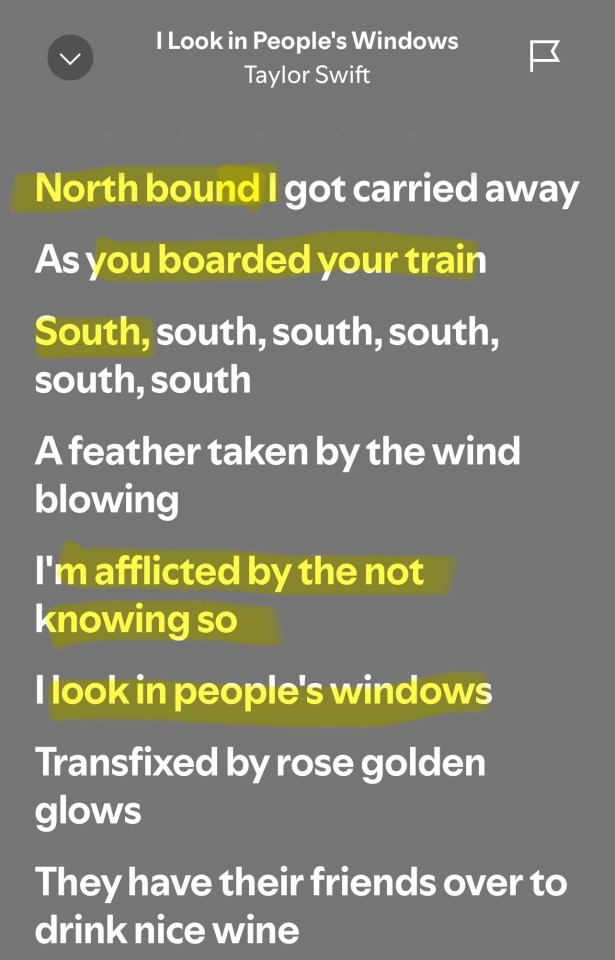
Taylor takes the train North, watching the other person takes the train South.
South could be a metaphor to “hell, sin” or simply not the “norm” etc. Gracie saying she’s surrounded by strangers but she prefers them is kind of reminiscent of that feeling of finding your “chosen family.”
“North” would then represent what’s seen as a “Normal Thing,” as Gracie named her (likely) bearding song, and “South” would represent getting off that “normal train” and going a new direction.
It could be that Taylor took one for the team. She blew up with the super bearding… a misdirection while she sent those who still have a chance the other direction.
I think this whole story is about Taylor showing young artists what can happen if you fall into the blender. She’s warning them, pushing for them to have a better chance at living authentically to bring more color to their art, rather than having to hide themselves to even be able to create art in such a constrictive industry.
*As always… could be completely misinterpreting 😂 but there are sooo many Taylor parallels in this album. I find new ones every time I listen.
@spade-riddles
45 notes
·
View notes